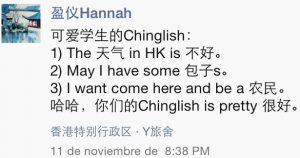While learning a second language, there is always a stage where you’re getting ahold of grammar but your vocabulary is limited. During this stage you tend to develop a highly entertaining mixture of your native language and the one you’re studying. During our trip one of our favorite jokes was to use “Chinglish”: the mixture of Chinese and English languages. Other versions of this idea include Spanglish (Spanish/English), Portuñol (Portuguese/Español) and Spinese (Spanish/Chinese). My friend and I actually discovered Spinese while shopping! We’ve both learned Spanish and sometimes communicate in Spanish so the shopkeepers won’t swarm us while we’re perusing. But sometimes Chinese adverbs slip out in front of Spanish verbs or I mix up vocabulary; something to the effect of “我 pienso que es 太贵了“ (I think it is very expensive). Those are usually caused by accident, though!
The “Chinglish” we’ve been using is generally used on purpose and in jest to have fun, also meaning that we use bad Chinese accents and basic vocabulary and grammar. We also use it to make our Alliance staff member laugh; we all love to make her laugh and smile! The bets part is when she started using it herself to make a joke! Near the end of our trip, it started raining. Take not that some of the first vocabulary you learn in LANG101 is affirmative, negative and weather. Right after it started raining hard, she smiled and said “The 天气 is 不好!” (The weather is not good!). We weren’t really expecting it, which made it even funnier. Now when she hands out water bottles, she’ll often say “Who wants some 水?” (Who wants some water?)

A few days ago she even posted a Moment on WeChat (similar to posting a post on Facebook) about her students’ Chinglish. I’ve added a screenshot of it (with her permisison, of course). 🙂
Some examples of Chinglish: “我要 sleep” (I want to sleep)—“These 包子s are 很地道” (These baozis are very authentic)—“长城 is the 长est 城 in China!” (The Great Wall is the longest wall in China!)—“有 meat 吗?” (Does this have meat?)All in all, it is a fun way to bond, practice and make insides jokes! Perhaps even memorize difficult vocabulary. I’m sure we’ll be referencing our Chinglish from this trip for months 😀
Chinese words: 笑 xiào to smile, to laugh 你乐什么呀?Ni3 lè shénme ya? What are you laughing at?
